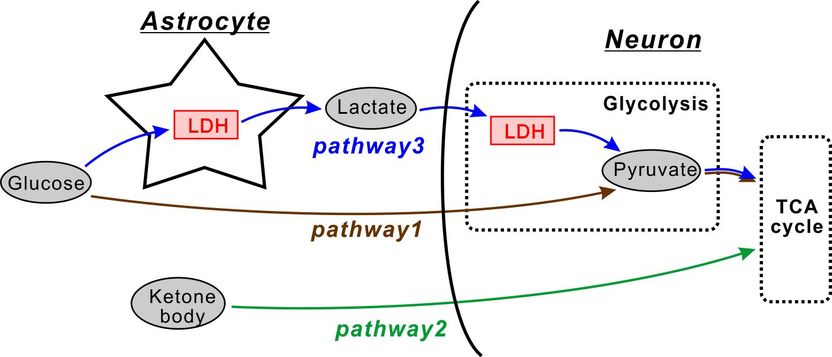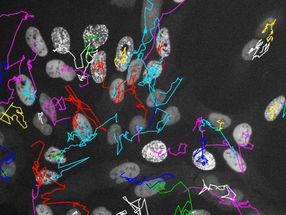Okayama University research: Enzyme-inhibitors treat drug-resistant epilepsy
Studies reveal how high-fat low-carb diets affect brain activity and highlight an approach for treating epilepsy with metabolic drugs.

A scheme of energy metabolic pathways in the brain. Glucose is transported into neurons and converted to pyruvate in glycolysis (pathway 1, brown). Ketone bodies directly activate the TCA cycle in neurons (pathway 2, green). Glucose is also transported into astrocytes (a type of glial cell) and converted to lactate by LDH, which is then released to neurons and converted to pyruvate by LDH (pathway 3, blue; the astrocyte-neuron lactate shuttle).
One percent of the world’s population suffer from epilepsy, and a third of sufferers cannot be treated with antiepileptic drugs. Diet control has been used to treat patients suffering from drug-resistant epilepsy since the 1920s, but how metabolic processes affect epilepsy has not been fully understood. Now researchers at Okayama University and Kawasaki Medical School have identified the metabolic pathways altered by diet treatments, the enzymes that can control them and potential metabolic drugs that may be effective for treating types of epilepsy that are resistant to other drugs.
‘Ketogenic’ diets used to treat epilepsy are high in fat and low in carbohydrate. Due to the scarcity of glucose available as a result, the brain metabolises ketones, which uses a different metabolic pathway.
Tsuyoshi Inoue and his team examined neural cells in an artificial cerebrospinal fluid solution switched from glucose to ketones. When glucose was switched to ketones the cells became hyperpolarized - a change in the cell’s membrane potential that makes neurons less prone to becoming excited and active.
The researchers further broke down the processes in the metabolism of glucose and identified a crucial enzyme – lactate dehydrogenase (LDH). Blocking LDH mimicked the switch from glucose to ketones in vitro. Further in vivo tests on mice confirmed the effect.
By testing the drugs already in use they identified LDH inhibitory action in stiripentol, a drug used for a rare form of the epilepsy. By modifying its chemical structure, they found an alternative LDH inhibitor with a similar structure that was more effective for in vivo tests on mice. They conclude, “Our study opens a realistic path to develop compounds for drug-resistant epilepsy by targeting LDH enzymes with stiripentol derivatives.”
Original publication
Other news from the department science

Get the life science industry in your inbox
By submitting this form you agree that LUMITOS AG will send you the newsletter(s) selected above by email. Your data will not be passed on to third parties. Your data will be stored and processed in accordance with our data protection regulations. LUMITOS may contact you by email for the purpose of advertising or market and opinion surveys. You can revoke your consent at any time without giving reasons to LUMITOS AG, Ernst-Augustin-Str. 2, 12489 Berlin, Germany or by e-mail at revoke@lumitos.com with effect for the future. In addition, each email contains a link to unsubscribe from the corresponding newsletter.






















































